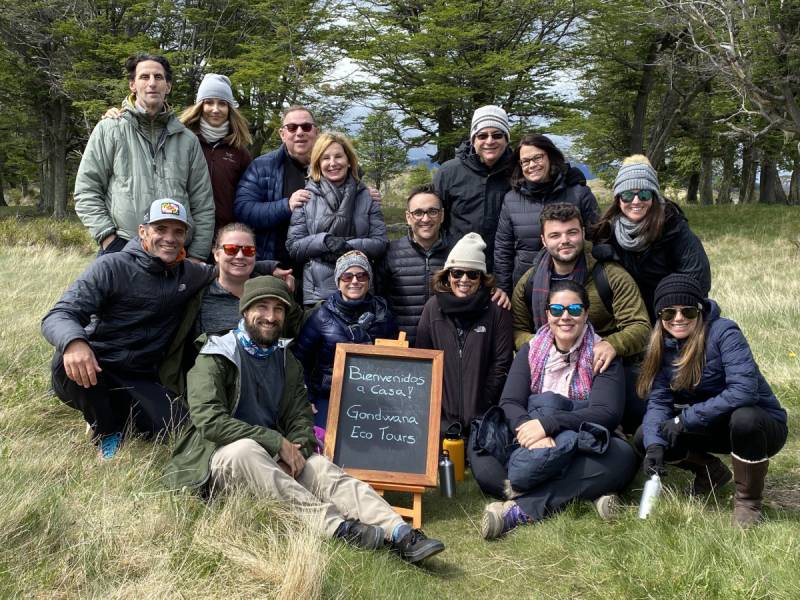Travel Rwanda, Sustainably!

Gondwana has been practicing sustainable travel since our beginning, and now the rest of the world is catching on! 5 publications have featured Gondwana’s Gorilla Trekking in Rwanda trip as an opportunity to practice eco-travel while seeing some of the world’s last remaining mountain gorillas. The Lady suggests to round up your friends and family, “and charm your significant other with something extraordinary” as you travel Rwanda.
The buzz around Gondwana’s sustainable practices and unique travel experiences continues to grow, with travelers increasingly drawn to the idea of immersive eco-friendly adventures. As more publications highlight Gondwana’s Gorilla Trekking in Rwanda trip, showcasing it as a rare chance to witness the majestic mountain gorillas in their natural habitat, the demand for responsible travel options is on the rise. The call to embark on this extraordinary journey with loved ones resonates with those seeking meaningful connections with nature and each other while making a positive impact on the planet. Gondwana’s commitment to sustainable travel not only offers unforgettable experiences but also sets a new standard for responsible tourism in the industry.
Environment Impacts Travel
All of these publications write that the urgency to travel (in our case to Rwanda) increased because of environmental instability. When global warming, politics, pollution and man-made problems impact the physical earth, plants and animals become victims as well. MSN warns, “The landscape is changing and the big adventures you are planning for the future may have to reflect that.” Of course these changes happen slowly over time, but the permanent impact for future generations is very real. This makes eco-travel even more relevant, because the goal is to experience the world, while preserving it for the future. Do as Eat Love Savor suggests, and experience “trips highlighting natural wonders, wildlife and cultures… …before potential changes alter their access or existence.”The bonus is that your visit also helps support their preservation.
How Environmental Instability Negativly Impacts Travel:
- Increased Urgency: Publications emphasize a growing urgency to travel, particularly to destinations like Rwanda, due to environmental instability.
- Global Warming Impact: The effects of global warming, including changes in landscapes and ecosystems, are prompting travelers to explore these destinations before they transform further.
- Political and Pollution Concerns: Environmental issues such as pollution and political instability are contributing factors driving travelers to visit destinations sooner rather than later.
- Impact on Wildlife and Nature: As environmental problems worsen, plants and animals suffer, making it imperative for travelers to witness and appreciate these natural wonders before they potentially disappear.
- Slow Changes, Permanent Impact: While changes may occur gradually, their long-term effects on future generations are undeniable, underscoring the importance of sustainable and eco-friendly travel practices.
- Relevance of Eco-Travel: The concept of eco-travel becomes increasingly relevant as travelers aim to experience the world while actively preserving it for future generations.
- Supporting Preservation Efforts: By engaging in eco-travel experiences that highlight natural wonders, wildlife, and cultures, travelers not only enjoy enriching experiences but also contribute to the preservation of these invaluable resources.
- Preparing for Potential Changes: Following suggestions from Eat Love Savor, travelers are encouraged to embark on trips to destinations showcasing natural wonders and wildlife before potential changes limit access or alter their existence.
How Does Ecotourism Positively Impact the Mountain Gorillas in Rwanda?

Yes, you can get this close to a mountain gorilla!
So how do the mountain gorillas in Rwanda (who are generally gentle) fit into all of this? Let’s start with the numbers via Tours.com: “A study released this year shows that 75 percent of primate species have shrinking populations and 60 percent are threatened with extinction, with their decline being attributed to hunting, farming, ranching, logging, mining and oil drilling.”
Specifically, there are only around 700 mountain gorillas in the world, largely due to the reasons above. Conservationists and park rangers in Volcanoes National Park devote their lives to protecting the remaining primates and have created a successful example of how ecotourism can positively impact these animals. In this case, a permit to see the gorillas ($750, included in the tour price) goes straight back to preserving the gorilla’s habitat and health. In 1985, during the days of Dian Fossey, there were less than 300 mountain gorillas remaining. This number has more than doubled because of conservation efforts made possible through funds received from nonprofits and ecotourism.
How You Can Support Gorilla Conservation Efforts by Traveling Sustainably
Conservation efforts for Rwanda’s mountain gorillas have been commendable and have significantly contributed to the protection and preservation of these majestic creatures. Rwanda’s government, along with various conservation organizations such as the Dian Fossey Gorilla Fund International and the International Gorilla Conservation Programme, have implemented rigorous conservation strategies aimed at safeguarding the habitat and well-being of mountain gorillas. These efforts include anti-poaching patrols, habitat restoration, community-based conservation initiatives, and eco-tourism development.
The establishment of Volcanoes National Park as a protected area has provided a safe haven for these endangered primates, allowing them to thrive in their natural habitat. Additionally, revenue generated from gorilla trekking permits has played a crucial role in funding conservation projects and supporting local communities, thereby creating a sustainable model for conservation. Through collaborative efforts and ongoing dedication, Rwanda continues to serve as a beacon of hope for the conservation of mountain gorillas, ensuring their survival for generations to come.
Ecotourism Works!
Fox News has also jumped on board , recommending that, ”No matter where you travel, be a responsible eco-tourist.” For Gondwana, this means ensuring that all of our tours positively impact the traveler and the destination. Through donations to nonprofits, carbon-offsetting, working with local businesses, recycling and other sustainable actions, we can help preserve our earth’s fragile ecosystem. Ecotourism works when people understand the impact of their actions, and make conscious, earth-friendly choices.


